
Marta Lamas Encabo is a Mexican anthropologist and political science professor at the National Autonomous University of Mexico (UNAM), and lecturer at the Instituto Tecnológico Autónomo de México (ITAM). She is one of Mexico's leading feminists and has written many books aimed at reducing discrimination by opening public discourse on feminism, gender, prostitution and abortion. Since 1990, Lamas has edited one of Latin America's most important feminist journals, Debate Feminista. In 2005, she was nominated for a Nobel Peace Prize.
Feminism in Argentina is a set of movements aimed at defining, establishing, and defending equal political, economic, and social rights and equal opportunities for women in Argentina. Although some women have been considered precursors—among them Juana Manso and Juana Manuela Gorriti—feminism was introduced to the country as a result of the great European immigration wave that took place in the late 19th and early 20th century. The first feminists did not form a unified movement, but included anarchist and socialist activists, who incorporated women's issues into their revolutionary program, and prestigious freethinker women, who initially fought for access to higher education and, later, legal equality with men. The early 20th century was also full of women fighting for their freedom and rights in the workplace. Despite the efforts of the first-wave feminists, Argentine women did not acquire the right to vote until 1947, during Juan Perón's first government. His highly popular wife, Eva, championed women's suffrage and founded and ran the nation's first large-scale female political party, the Female Peronist Party. Although she refused to identify herself as a feminist, Eva Perón is valued for having redefined the role of women in politics.

Ximena Bedregal Sáez is a Chilean-Bolivian architect, writer, theoretician, professor, editor, photographer, and feminist lesbian. In Mexico, she founded Centro de Investigación, Capacitación y Apoyo a la Mujer, and edited its magazine, La Correa Feminista.

María Julieta Kirkwood Bañados was a Chilean sociologist, political scientist, university professor and feminist activist. She is considered one of the founders and impellers of the Chilean feminist movement in the 1980s. She is considered the forerunner of Gender studies in Chile.
Rosa Inés Curiel Pichardo, better known as Ochy Curiel, is an Afro-Dominican feminist academic, singer and social anthropologist. She is known for helping to establish the Afro-Caribbean women's movement and maintaining that lesbianism is neither an identity, orientation nor sexual preference, but rather a political position. She is one of the most prominent feminist scholars in Latin America and the Caribbean.

Celia Amorós Puente is a Spanish philosopher, essayist and supporter of feminist theory. She is a key figure in the so-called equality feminism and focused an important part of her research in the building of relations between Enlightenment and feminism. Her book Hacia una crítica de la razón patriarcal constitutes a new outlook on the gender perspective of philosophy, revealing the biases of androcentrism and claims a critical review on behalf of women.

Mónica Tarducci is an Argentinian anthropologist and feminist activist. Her research focuses on the intersections of gender and religion, and on the adoption of children in the province of Misiones. Tarducci currently teaches at the Universidad de Buenos Aires and at the Universidad Nacional de San Martín.
Gladys Ethel Parentelli Manzino is a Uruguayan feminist theologian and photographer who has lived in Venezuela since 1969. A representative of Latin American ecofeminism, she was one of three Latin American women appointed by Pope Paul VI as observers at the Second Vatican Council.
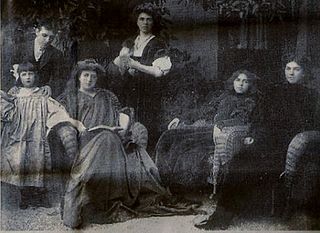
Ximena Morla Lynch (1891–1987), also known as Ximena Morla de Subercaseaux, was a Chilean feminist writer and painter. The daughter of writer Luisa Lynch and conservative politician Carlos Morla Vicuña, she had five siblings, including Carlos, a diplomat, and Carmen, a writer. Her granddaughter is the novelist Elizabeth Subercaseaux.

Carmen Morla Lynch (1887–1983), also known as Carmen Morla de Maira, was a Chilean feminist writer. The daughter of Luisa Lynch and Carlos Morla Vicuña, she wrote journals illustrated by her sister Ximena, with whom she also practiced spiritism, both as mediums. Her brother Carlos was a diplomat, writer, and journalist. She was the great-aunt of writer Elizabeth Subercaseaux.
Margarita Ammann Martínez, better known as Gretel Ammann was a Spanish philosopher, essayist, activist, radical feminist, and lesbian separatist. She was a pioneer of feminism in Barcelona.
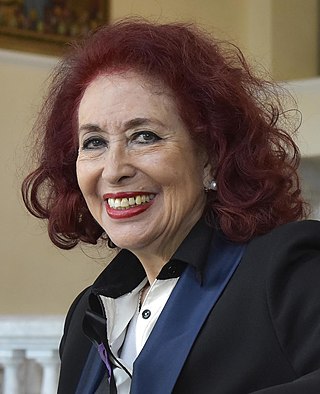
Lidia Falcón O'Neill is a Spanish politician and writer. With a degree in law, dramatic art, and journalism, and a PhD in philosophy, she has stood out for her defense of feminism in Spain, especially during the Transition.

Alicia Miyares Fernández is a Spanish philosopher, feminist, researcher, and women's rights activists. She has served as the spokesperson for several feminist organizations including anti-womb renting No Somos Vasijas and Recav. She has been involved with the efforts to keep abortion legal, writing the manifesto for the 2014 Tren de la Libertad. Miyares Fernández was active in advocating feminist causes ahead of the 2019 Spanish general elections.

Romani feminism or Gypsy feminism is the feminist trend that promotes gender equality, the fight against social inequalities and the defense of the integration of women in different movements in society, making these processes compatible with the preservation of culture and values of the Romani people.

Elvira V. López was an Argentine feminist, activist, reformer and author.
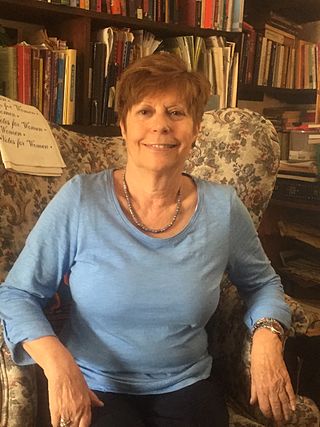
Ana Lau Jaiven is a Mexican feminist, academic and researcher at the UAM Azcapotzalco. She began studying Mexican feminist movements in 1980, and has gone on to study women in the Mexican Revolution, and women's movements and groups throughout 20th-century Mexican history. Francesca Gargallo places her in a group of Latin American feminist historians alongside Julia Tuñón, Ana Arroba, Edda Gabiola and Araceli Barbosa.

Suzana Prates was a Brazilian feminist sociologist and academic. She spent most of her professional career in Uruguay where she dedicated her life to national and Latin American feminist thought. She was the founder of the "Centro de Estudios e Informaciones del Uruguay" (CIESU) and, at the end of the 1970s, she founded the "Grupo de Estudios sobre la Condición de la Mujer en Uruguay" (GRECMU). Her colleagues included Julieta Kirkwood and Elizabeth Jelin.
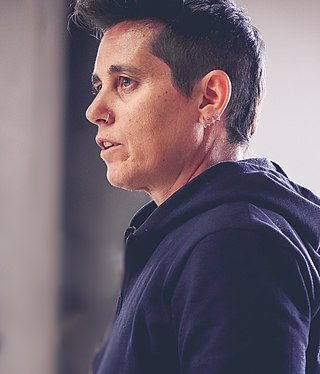
Valeria Flores, also stylized as val flores, is an Argentinian writer, teacher and lesbian queer activist. She is dedicated to queer theory and pro-sex feminism. She writes theoretical essays characterized by a poetic writing, and poetry. Along her published books we find: interruqciones. Ensayos de poética activista, Deslenguada. Desbordes de una proletaria del lenguaje y El sótano de San Telmo. Una barricada proletaria para el deseo lésbico en los 70. She also carries out performances and workshops as forms of political, aesthetic and pedagogical intervention.

Raquel Olea is a Chilean writer, professor, cultural critic, and researcher. She is a Distinguished Professor of Arts, Letters, and Humanities (Emerita) at the University of Santiago. Her areas of research are Spanish, Chilean, and Latin American literature, as well as gender studies and women's literature, of which she was an important promoter during the time of the military dictatorship in Chile. She is recognized for her research on the work of Gabriela Mistral. Furthermore, Olea is a prominent figure of second-wave feminism in Chile during the Pinochet military dictatorship years.
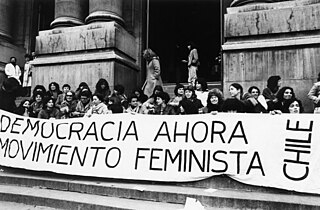
Corporación de Desarrollo de la Mujer La Morada, also known as Casa de la Mujer La Morada, or simply La Morada, is a Chilean non-profit, non-governmental organization (NGO) based in Santiago, that works to expand women's rights through political participation, education, culture and efforts to eradicate violence.















